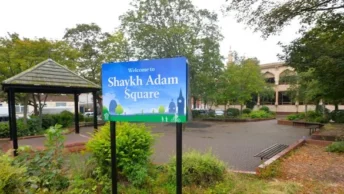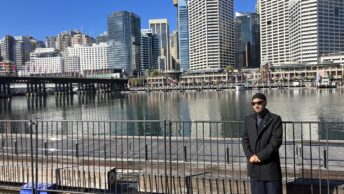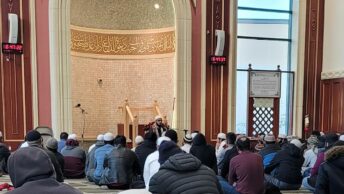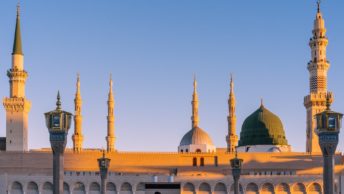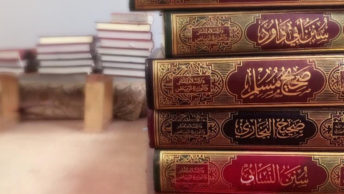Al-Hamdulillah, I returned home safely after my four day visit to the Island of Trinidad in the Caribbean (West Indies). Although I had visited the neighboring Island of Barbados some 20 years ago (and also spent one day there this time around), this was my first visit to Trinidad. I travelled via Caribbean airlines on Friday March 27 2015 from Gatwick airport and, after a long nine hour ‘bumpy’ flight, landed at around 7pm local time in the capital city Port-of-Spain.
Brief Background of Trinidad
Trinidad is a small country and the larger and more populous of the two major islands which make up the nation of Trinidad and Tobago. The twin island country is off the northern edge of South America, and lies just off the coast of northeastern Venezuela. The third-largest and capital city is Port-of-Spain, after the cities of Chaguanas and San Fernando. However, the country is so small that they are more like large towns than cities, and it takes no more than an hour to travel from one place to another.
The country remained a Spanish and British colony (amongst others), and obtained independence in 1962, becoming a republic in 1976. It is one of the richest countries in the Americas after United States and Canada, with the country’s economy primarily industrial, with an emphasis on petroleum and petrochemicals. The country’s wealth is mainly attributable to its large reserves of oil and natural gas. The country’s official language is English (and the second language is Spanish), but the locals speak English with such a heavy accent that it feels at times they are speaking a different language!
The locals comprise mainly of Indian/South Asian descent (known as Indo-Trinidadians) and African descent (known as Afro-Trinidadians). The former are predominantly Muslim and Hindu, whilst the latter are mainly Christian but also some Muslims. Many Indians came to Trinidad (primarily between 1845-1917) escaping poverty in India and seeking employment offered by the British for jobs either as indentured laborers, workers or educated servicemen, and some even as slaves. They hailed from various regions of India such as Uttar Pradesh, Bihar, Punjab, West Bengal, Calcutta and Madras. In terms of appearance, Trinidadians either appear as Indians, Africans or a mixture of both (known locally as Douglas). Although some Trinidadians can trace their ancestry back to India or Africa, most now simply consider themselves as natives and have no clue where their ancestors came from. In contrast to the UK and other Western countries where Muslims and people of other ethnic groups know their origins, may have family ‘back home’ and often visit their ancestral lands, the locals here know nothing as home except Trinidad. Their mother tongue is English, and they do not speak any of the subcontinent languages such as Urdu or Hindi. Whether young or old, they all speak English at home and even the Darul Uloom programs are taught in English and Arabic. As such, even most scholars cannot read or write Urdu despite their ancestral land being India.
I was invited by the Rashadi Foundation which was established in 2011 by a group of young scholars and concerned individuals under the supervision of a well known local scholar Shaykh Abdus-Salam Rashadi (whom I met a few years ago in Toronto). They arranged for me to deliver lectures in various locations relating to marriage, divorce and other family matters.
My flight was slightly delayed, so on Friday night it was only possible to meet my hosts over dinner and discuss the literary ahead.
Saturday 27th March, 2015
The next (Saturday) morning, after performing fajr prayers, brisk walking and a healthy breakfast, I delivered a talk at 11am at Masjid al-Muttaqeen (a well known Mosque in Cunupia, central part of Trinidad) mainly for sisters. The topic was ‘Secrets to a successful marriage’ and I was informed that some 150 sisters attended the talk. A handful of brothers also attended. I mentioned in the talk that the main and most effective secret or ingredient to a happy, prosperous marriage is ‘God-consciousness/fear of Allah/accountability in the next life’ (taqwa). If spouses realize that they will be accountable before Allah in how they treat, behave and talk to their partners, their marriages will prosper. I spoke until Zuhr prayers, after which a special session for graduate female scholars (alimat) was arranged. In about an hour, I mentioned some 7/8 points in relation to studying, teaching, preaching, etc…
In the evening, after Maghrib prayers, another talk was arranged for brothers and sisters titled ‘Causes and solutions to marital and family disputes’ at Nur al-Islam Mosque (near the Capital city Port-of-Spain). The event was well organized in the lecture hall downstairs with good seating arrangements for both men and women. I discussed five main causes of family disputes and attempted to highlight some of the solutions. A Q & A session followed the talk, and lasted until Eisha. After Eisha, we had dinner at the Mosque in the company of Imam Sheraz Ali (whom I found to be Masha Allah very active, balanced in his thoughts, and hard-working in the field of Da’wa – may Allah reward his efforts), Mufti Abrar (a young, bright scholar) Mawlana Siraj and others. After dinner, we went for some night time sightseeing and enjoyed fresh coconut water along the way, before returning home for rest.
Sunday 28th March, 2015
The following day (Sunday), after Fajr prayers and wonderful breakfast at a lovely brother’s house, I was invited to be a live guest at the Islamic Network (TIN) TV channel. The channel is run by the Darut Tarbiyah organization under the guidance and supervision of reputable scholars, and Al-Hamdullaih many prerecorded and live programs are aired. I was hosted by Imam Sheraz Ali from 9am till 10:30am, in which we discussed issues relating to marriage and family life. Some of the viewers called in with their questions which I attempted to answer, may Allah make it beneficial for everyone, Ameen. I also had the pleasure of briefly meeting Mufti Waseem Khan, one of the directors of the Chanel and also the principle of the well known local Darul Uloom. Masha Allah, he is considered as one of the most senior scholars of Trinidad and very active in the service of Islam, may Allah bless him and reward his efforts, Ameen.
Thereafter, we went on a sightseeing tour of North Eastern part of Trinidad, and Subhan Allah some of the costal and forest views were breathtaking. The Qur’an encourages us to see the mountains, and thus it gave us the opportunity to marvel at the creation of Allah. We went in two vehicles, and I was accompanied in my vehicle by Mufti Muhammad Chothiya (a very talented scholar who is originally from Barbados, but moved to Trinidad for Da’wa purposes). The discussions with him throughout our touring were very insightful to say the least! We visited a location near the coast where the Rashadi foundation plan to erect a Mosque, and had the opportunity to perform Asr prayers in congregation at the beach which felt amazing Al-Hamdulillah.
In the evening after Maghrib prayers, I delivered a talk at Masjid al-Huda in the Marabella region of Trinidad. The Masjid is connected to a Madrasa called Jamia Madinatul Uloom, where students study to memorize the Qur’an and also become scholars. The title of my talk was ‘Building a happy home and upbringing of children.’ By the grace of Allah, I discussed in about an hour the rights of children and how we should bring them up with love, care and building an Islamic environment at home. After the talk, I coincidently met brothers from Dewsbury (UK) traveling in Jama’ah Tabligh, who were pleasantly surprised since they did not expect someone from the UK giving a talk in Trinidad! At dinner, I had the pleasure of meeting the many young teachers and scholars of the Jamia. They, Masha Allah, have studied in various parts of the world such as Pakistan and South Africa, with some also qualifying as Muftis and thus working in the Darul Iftaa. I saw much good in them, and it is hoped they will advance the teachings of Islam in Trinidad In sha Allah. Thereafter, we returned home for much needed rest!
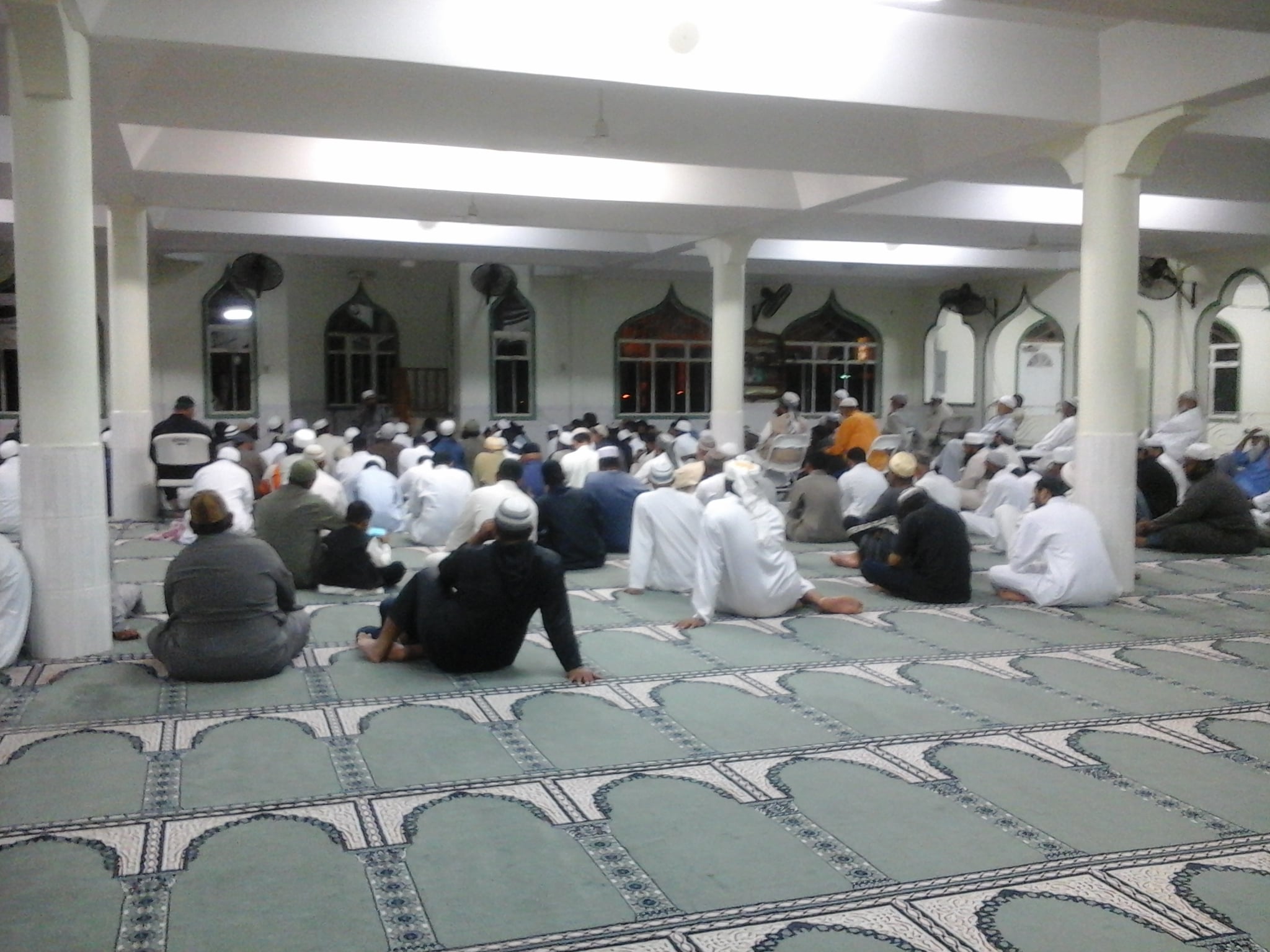
Monday 29th March 2015 in the Island of Barbados
The next day (Monday) was spent in the Island of Barbados. The trip was purely recreational and visiting relatives and friends. Barbados is a beautiful country, and hopefully I can spend more time there next time around. However, here are a few images from there:
Tuesday 30th March, 2015
After returning from Barbados via air the night before, On Tuesday morning , we once again went for a sightseeing tour. We visited the coastal region of Maracas, and Subhan Allah the scenery was out of this world! Green Forest Mountains, the ocean behind the mountains, sandy beaches and the beautiful coconut trees… all left me overwhelmed and the words of Allah “So blessed be Allah, the Best of creators” kept coming to my lips. The “Bake and shark” dish at Maracas beach was very tasty Masha Allah. It consists of fried flatbread (“bake”) filled with fried pieces of shark meat and various other ingredients and sauces. If you ever visit Trinidad, this dish is a must! Here are some of the absolutely breathtaking images from this part of Trinidad:
During the sightseeing, while stopping to enjoy the view of the coastal mountains and the ocean behind, we met a local brother who expressed his interest in Islam. He already had some knowledge about Islam and had been interested, so it took only a few minutes for him to embrace Islam. I explained the basic beliefs, and he then said the Shahada and entered Islam Al-Hamdulillah. May Allah keep him and us steadfast, Ameen.
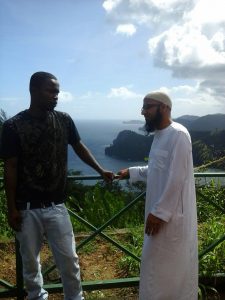
After the sightseeing tour, in the afternoon we visited the famous Institute of Islamic learning: the Darul Uloom of Trinidad. I had heard much about the Darul Uloom over the years, and thus it was an honor to witness it for the first time with my own eyes. The Darul Uloom was established in 1984 by Mufti Shabil Ali (Allah have mercy on him) who served as its first principal. After his passing away in 1996, Mufti Waseem Khan succeeded him as Principal. The institute offers many services such as memorization of the Qur’an, Alim course, Fatwa department, Halal certification and moon sighting, as well as Science and Academic Education. Many young scholars (ulama) of Trinidad are graduates of the Darul Uloom. It also runs a female section from which many sisters have graduated as scholars (alimat).
I toured the beautiful Darul Uloom premises which included the Mosque, classrooms, dorm facilities, etc. It was also a pleasure to meet and sit in the company of Shaykh Abdus-Salam Rasahdi in his office, who is one of the senior teachers of the Darul Uloom. May Allah preserve the institute and make it a shining light of guidance and spirituality in Trinidad and beyond, Ameen.
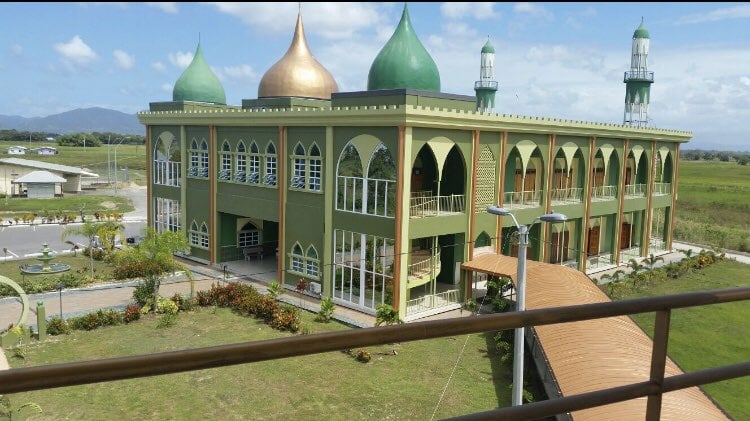
After visiting the Darul Uloom, I prepared my luggage and headed for the airport for an evening return flight to Gatwick airport. With sadness, I bid farewell to the brothers who came to see me off at the airport.
General thoughts and reflections on Trinidad
Trinidad has an absolutely wonderful landscape; from beautiful palm/coconut trees, green forest hills and mountains, waterfalls, sandy coastlines and of course the clear ocean sea – in addition to the warm climate. One cannot resist but marvel at the natural beauty created by Allah Most High. We spent a lot of time sightseeing and enjoying the fantastic views throughout the country. The high forest mountains, in particular, lush with greenery are a sight to behold. It is also possible to find quieter places on the coastline and enjoy the blessing of sea water. The Qur’an on numerous occasions encourages us to look and contemplate the beautiful creation of Allah. If natural beauty is your thing (and it should be), Trinidad is a must-visit country.
Secondly, Allah Most High has further blessed this part of the world with much halal, pure and wholesome nutrition. Every day, we were blessed with fresh fruits, juices and vegetables. Mangos, watermelons, passion fruit, guavas, avocados pineapples, West Indian cherries, bananas and various other types of fruits are readily available to enjoy and keep one healthy. On every other street, you can find fresh coconut water being served – which is extremely healthy, replenishes electrolytes and high in potassium and magnesium. The land is saturated with local pure honey (considered a means of cure in the Qur’an), and the various types of fish is equally good in taste as it is for health. The bake and Shark dish was particularly tasty. All in all, one could live off natural, healthy and organic foods, but sadly junk take away food is becoming a fast trend even amongst Muslims. I encouraged the locals to avoid such junk food as much as possible and stick to homemade healthy meals!
Thirdly, I found Trinidadians to be extremely pleasant, gentle, humble, considerate and hospitable. From people at airport immigration to those living in the suburbs, they are all generally very nice. Of course, every tree has bad apples, and the brothers did point out to certain areas where gang life, drugs and other crimes are rife. However, in general – especially the local Muslims with whom I interacted – I have nothing but words of praise for them. I have visited many countries, but I must say the Trinidadians are some of the best I have come across – lovely people with wonderful personalities Masha Allah. They know how to look after and treat their guests, and generally are very well mannered. I did not come across any arguments or street altercations during the few days there. I was indeed asked questions relating to marriage and family problems, but such issues are prevalent everywhere. Actually, in one of my lectures I stated that you guys are so gentle; I find it difficult to understand you have many problems! I also lightheartedly said to the brothers that if someone was in search for a nice spouse, I would definitely recommend a visit to Trinidad, to which the brothers responded that only the males were nice and not the females. Of course, I took that with a pinch of salt!!
Fourthly, one is able to practice Islam freely, without any governmental pressure or irritation from the locals. Muslims can dress Islamically and go about their business as they wish without anyone raising even a eyelid. Many local Muslims are influential and involved in mainstream politics, and even the presidency was recently served by a Muslim. Muslims are also financially stable, with many Islamic initiatives being supported by them.
The many Mosques all over the country are, by and large, well attended. Many of the Imams are well versed in Tajwid and Qur’anic recitation; I was impressed by the recitations of Imams of the Mosques I visited. There are over 200 male and female scholars all over the country including those versed in giving religious verdicts (fatwa). Generally, I felt they all respected one another and avoided the blameworthy traits prevalent within some such as jealousy, bickering, and polemical argumentations. Darul Uloom Trinidad, Jamia Madinat al-Uloom and other similar institutes are Al-Hamdulillah serving the thirst of the locals in a very effective way. Many non-Muslims are thirsty and are embracing Islam in their hundreds through the effort of local scholars and activists. The Tabligh Jama’a is also playing its role in trying to bring people closer to practising Islamic teachings.
The Rashadi Foundation, who invited me, is doing a wonderful and much needed work in building awareness of Islam in the hearts of people. It organizes many outreach programs, provides recreational activities with the aim of social welfare and improving the conditions of life for the local community, publishes Islamic literature, arranges educational and motivational seminars, aims to construct Mosques in every community, and distributes resources to meet the needs of those less privileged in the community, amongst other things. For more details, see their website www.rashadifoundation.org
All in all, most things are positive in this beautiful country. May Allah preserve our brothers and sisters there, increase them, and grant them the ability to carry out more good. If anyone is thinking of moving to another country, I would definitely recommend Trinidad!
Finally, I would like to thank the Rashadi Foundation for inviting me and giving me an opportunity to meet and mutually benefit from the Muslims of Trinidad. I would like to extend my appreciation to the local brothers who made my stay extremely pleasant; in particular, Shaykh Abdus-Salam Rashadi (the patron of Rashadi foundation), Mufti A Majeed (who escorted me on many occasions, and from whom I benefited greatly during our fiqh discussions), brother Zahir (who also drove me to the various sightseeing excursions, and who Masha Allah is financially very supportive of local Islamic projects), Qari Mas’ud (who is very active in the Rashadi foundation), Mawlana Shibli (a lovely brother who made my stay very pleasant, although his heavy Caribbean accent was difficult to understand!), Hafiz Abdullah (whose smile and lighthearted personality always brought a smile to my face), the young students Ya’qub, Ibrahim and Adam (who all left nothing in offering their assistance to a foreign guest), Mawlana Shiraz Ali (whom I know from my time studying at Darul Uloom Bury), and last but not least Mawlana Ahmad Khan (a lovely brother inside and out, who was the main instigator of my visit to Trinidad). I may have forgotten some other names, but their reward is with their Lord. May Allah reward all their efforts, and grant them all the good of this life and the next, Ameen.
Wassalam
Muhammad ibn Adam al-Kawthari
Darul Iftaa, Leicester, UK
4th April, 2015
























